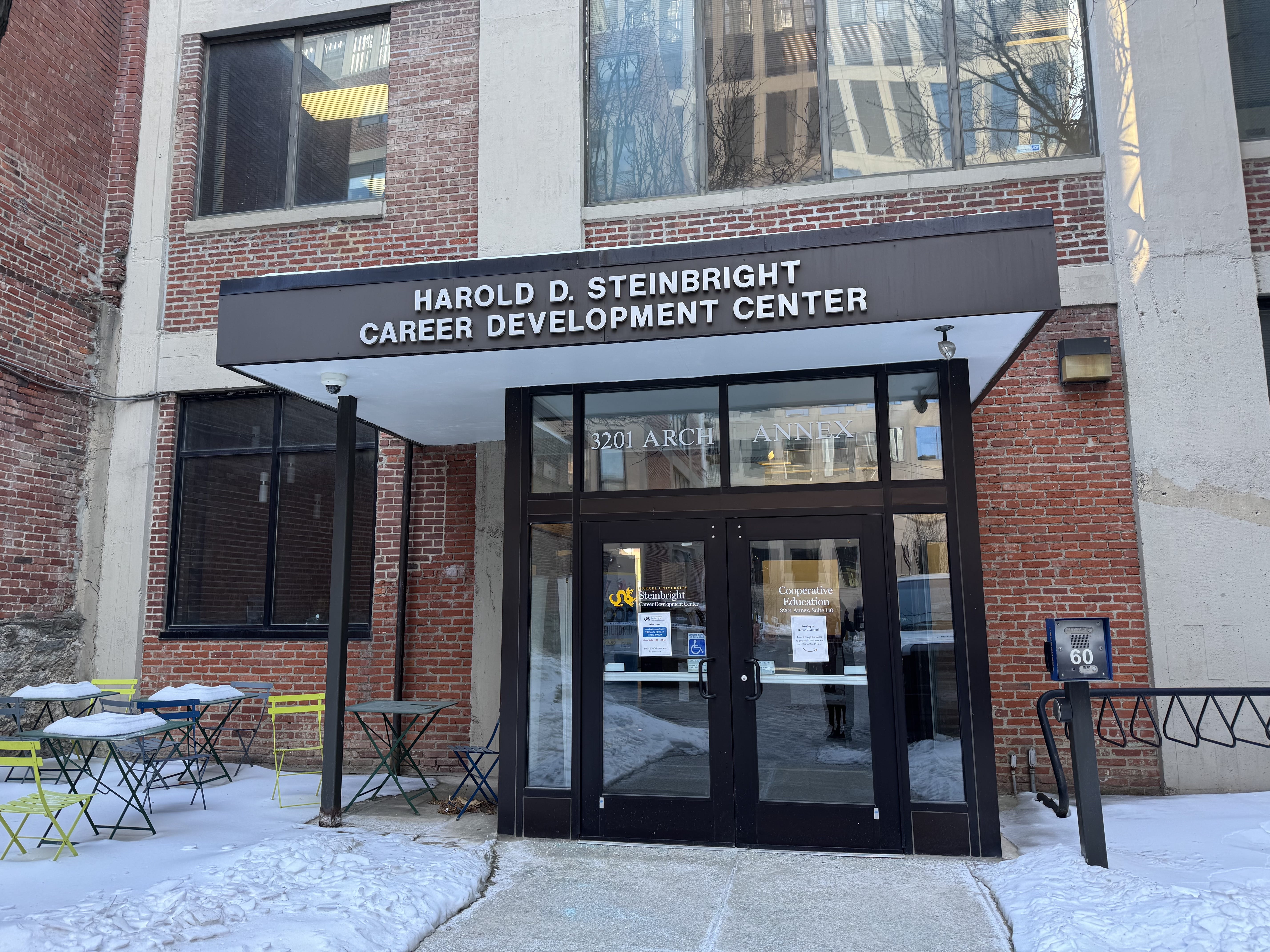Five Little Known Facts: Drexel University Housing

It’s strange in concept, but Drexel University Housing admits that its aim is for students and their families to not even have to think about them.
From incoming students filling out their housing application for the first time to the upperclassmen who choose to live on campus their entire time on campus, the goal of University Housing is to be an invisible hand guiding students through their Drexel experience.
And for being invisible, they’re pretty important.
“Our literature shows that people who live on campus are usually more academically successful than those who don’t, and they retain,” said Tyler Groll, associate director of University Housing and Conference Services. “So there is absolutely a benefit to what we do.”
Overall, about 4,300 Drexel students live on campus through University Housing, whose accommodations include: Kelly Hall, Millennium Hall, Myers Hall, North Hall, Race Street Residences, Towers Hall and Van Rensselaer for first-year students; Caneris Hall and select floors of North Hall for upperclassmen; and Stiles Hall for both undergraduate and graduate students based in the Center City Campus.
And when it comes to campus housing, there are two facets that are uniquely Drexel. One is the 2-Year Residency program, which requires full-time undergraduate students whose permanent address is outside a 10-mile radius of campus to live in a Drexel residence hall their first year, and in a residence hall, fraternity/sorority housing or University-affiliated housing their second year. University Housing also works with students around co-op, and works with students to suspend their housing contracts if they receive placements outside of a 10-mile radius of campus.
All of this was put forth in order to bolster Drexel’s on-campus offerings and maintain a safe, interactive and highly engaged residential community.
“We used to be a commuter school. We don't want to be a commuter school, we want students on campus,” said Sasha Gamburg, associate director of occupancy management for University Housing.
But from these uniquely Drexel housing situations, misconceptions and confusion can arise. Groll and Gamburg talked through the common myths they believe students and parents may hold, as well as well as what their department has done to combat them.
Only first-year campus living is required by Drexel
Drexel’s 2-Year Residency program was implemented back in 2011, and since then Gamburg said awareness and understanding of the program has grown leaps and bounds. However, there is still some confusion from entering students who don’t understand the requirement, as well as pre-juniors who think there’s a requirement to live on campus, though these are both a very small minority, Gamburg added.
“I don’t know if it's a misconception. Some students might not understand what they're signing up for when they are entering Drexel University,” she said of entering students. “It’s a very intentional decision the University moved towards only a couple years ago.”
To help combat this specifically with first-year students, housing staff visit UNIV 101 classes that they are invited to in order to educate about the program and other prevalent University Housing myths.
“The more we can get to [present], the more we can be proactive rather than reactive, and we definitely try to be,” Groll said.
University Housing can accommodate all requests
Where University Housing tries to be proactive, they also try to be realistic. The team does everything they can to accommodate requests based on the facilities and resources they have available, but they also have uniquely Drexel situations to work around, with co-op being the most omnipresent. However, University offers a simple solution.
“Very few schools have the turnover we have from quarter to quarter to quarter to quarter,” Gamburg said. “We want to support students’ cooperative education so if students have a great opportunity in California, they can cancel their housing and there’s no questions asked. You just tell us that’s what you’re doing.”
However, if students obtain co-ops within that 10-mile radius of campus, they are expected to uphold housing requirements as if they were taking classes.
“So if your co-op is in Center City, we still want you on campus. We still want you to engage,” Gamburg said. “We want you to bring back your experiences from that co-op. But if your co-op is far away we definitely want to support that.”
Another factor that has been tricky for University Housing to navigate are the increased sizes of Drexel’s incoming classes. Specifically, the University enrolled nearly 1,000 more freshmen in fall 2017 than it did in fall 2016. Though University Housing has no input into the admissions process, they roll with the punches and work on finding solutions in a majority of scenarios. For instance, the opening of Bentley Hall is something they hope will accommodate as many students as wish to live on campus moving forward.
“I think there are a lot of reality checks, though, about what is reasonable,” Groll said.
“We try to be the mirror of, ‘This is a great idea. Let's talk through how we can make this happen,’” Gamburg added.
One thing the University Housing team takes pride in having made happen is the amount of gender-inclusive housing available on campus. Housing in these facilities is only separated by gender if there is a bathroom restriction (if there is only one bathroom on that floor). Only two buildings have such restrictions: Towers and Kelly Hall. In every other building, the opportunity for gender-inclusive housing is not restricted, even though Gamburg said the interest from students usually fluctuates from year to year.
“Drexel is a very inclusive institution overall already,” Groll added. “With our housing options, it’s hard to compare. In that aspect, we are leaders.”
University housing also works with Residential Living to ensure housing materials reflect a student’s preferred name, and any student who is transitioning or who identifies as non-binary does not have to enter gender-inclusive housing if they so choose.
“However they identify, we will house them that way,” Gamburg said. “If you identify as female, we’ll assign you with female students.”
University Housing is not on the front lines when it comes to student interactions
Just as University Housing wants all Drexel students to feel secure and comfortable in their housing situation, the team also wants students and their families to feel heard. That’s why they’ve put themselves at the forefront of housing-related feedback, even when that feedback doesn’t necessarily fall within their jurisdiction.
“Runaround is something that stops at our office,” Gamburg said. “We may not resolve it, but we’ll get them to where they need to go.”
Groll said his team tries to support a 24-hour response time for inquiries to their office, and sometimes bring in more assistance during peak moments in the annual cycle. He added that they often get calls regarding students living in facilities operated by American Campus Communities (ACC), which includes Chestnut Square, The Summit and University Crossings.
“I think people see ACC as an extension of Housing/Residence Life, and so oftentimes we are the first call, which is fine,” he said. “We will absolutely connect them [with the right people].”
University Housing’s relationship with ACC can be confusing, Gamburg and Groll agree, since they’re both on campus and affiliated with the University. However, they won’t let such confusion put students at a disadvantage.
“For example, in January, we’ve had folks who apply for University Housing and also ACC, not realizing that those are different,” Gamburg said. “We'll reach out to them and say, ‘Hey, did you realize you’re doing both?’ and we will refund their deposit and we will cancel their application if that’s what they want to do. … But we have that communication. You made a mistake because you were confused. Let’s help you clarify.”
University Housing is not forward-thinking, nor trying to plan for the unknown
University Housing is always trying to anticipate pain points and inefficiencies, though there is one major factor to their planning that even the best crystal ball could not help them forecast: freshman yield.
“When there were a lot more students who said ‘yes’ to Drexel than [Admissions] anticipated in terms of the yield, they couldn’t predict for that because that was unprecedented,” Gamburg said. “It was very exciting, but that created challenges for housing, challenges for class size, challenge for judicial and conduct. You know, it’s a boulder rolling down the hill.”
To combat this, University Housing creates annual projections of scenarios from a very small class size all the way up.
“We do that by every 500 students, like, ‘What we do if this comes in?’ We are thinking of those things.” Groll said. “Housing and Residential Living has definitely thought through, ‘What do we do if?” and then fill in the blank.”
University Housing has also recently been moved to now fall under Student Life, which also joins Admissions under Enrollment Management and Student Success (EMSS) umbrella.
“So, I think there’s definitely going to be a lot more communication about what's happening with the first-year classes,” Gamburg said.
University Housing interactions can still be successful without student involvement
And from the first-year students whom they house to the fifth-years who choose to live on campus their whole time at Drexel, there is one key expectations that University Housing holds.
“Coming to Drexel should be the start of students taking the lead on their housing and education,” Gamburg said.
Though they are happy to work with parents and guardians as well, University Housing implores that students also be involved in any conversations surrounding applications, conflicts and everything in between.
“People think we don’t want to work with parents sometimes,” Groll said. “Parents are absolutely partners, but it’s a partnership with their student.”
University Housing is one of the many guiding forces in ensuring students can be successful at Drexel. And as with many learning experiences in college, they think it’s important for students to learn certain lessons themselves, without anyone doing it for them.
“We’re an educational institution,” Groll said. “Learning does not stop in the classroom. It definitely happens over in Housing as well.”
Check back in the coming weeks for a Five Little Known Facts feature on American Campus Communities.
In This Article
Drexel News is produced by
University Marketing and Communications.

